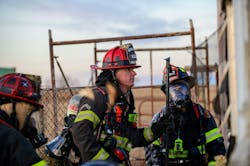Key Takeaways:
- Taking the time to learn about the crew, their routines and operational strategies helps create a rapport. This should be done early in the shift.
- Even if the role is temporary, the acting officer carries full responsibility for the crew’s performance, safety and response readiness and should take it seriously.
- After a successful shift, following up with their regular officer while acknowledging the crew's contributions helps ensure continuity and your commitment to professionalism.
So, you want to be an acting officer. As many have said, some are born leaders, while others become leaders. However, sometimes, we are pushed into the acting officer role.
Some departments require their personnel to act as an officer in some capacity as a matter of course. For other departments, it can be an option to help individuals to prepare for a permanent promoted position.
Resulting from whatever circumstance, the role of being in charge must be taken seriously. The lives of the people who are under your supervision—as well as those potential victims who might call on you to rescue them—might depend on you.
Complexities of crew dynamics
The acting officer role can be difficult to navigate. In my experience, you’re given all of the responsibility of a promoted position with none of the weight or expectation to perform. As such, you might get treated differently by the crews and the battalion chiefs. Put another way, from the crew’s perspective, you are the “stepdad/stepmom” for the tour, and most of the time, the members of the crew put on their good boy/good girl hat—they know that you aren’t their normal boss—and they usually try to be cordial while you’re in charge. This can be good and bad, in that the crew members might seem reserved and, thus, not necessarily show their true colors.
However, dealing with the complexities of crew dynamics is a struggle that’s less apt for a temporary company officer than it is for the actual company officer. Some crews will take advantage of a temporary officer, both good and bad. From the latter, I had crews get into the recliners and yearn to stay there for the entirety of the shift, trying to exploit my lack of familiarity with the station and district. Regarding the former, other crews knew that I am the training type of guy and used my knowledge and experience to get out and train on things that they wouldn’t usually get their actual officer to train on.
I recommend these three actions to make your time in someone else’s firehouse the most beneficial for all parties: ask, connect and offer.
Ask
When you go into a crew’s house, be curious and ask the members of the crew how they operate. As an individual, it’s much easier for you to adapt to them rather than having an entire crew try to adapt to you.
Furthermore, you must own your weakness. Because the crew knows the station, apparatus and district, you must put a token of trust in them, because you are reliant on them. That said, if members of the crew have the mindset that they wish to recliner-surf all day, one option is to recommend a one-hour training that they lead. Let them pick the subject: It could be something particular to their engine or district. Allowing them to teach you creates buy-in, shows your humility and gets them engaged. Simply saying, “Hey, can you help me understand this?” can break down walls and get an individual or all of the members of the crew engaged.
Limiting training to an hour can be a key to mitigating resistance from those who have preconceived wants for an easy shift. Most firefighters are willing to entertain a training idea for an hour—even not realizing that an hour went by when the training concludes. A lot of times, the discussion alone will occupy the bulk of the time.
For example, there was an instance when I roved into a tech rescue station that housed the department’s heavy rescue. Although I was introduced to the majority of specialties at academy, I wasn’t versed in the intricacies. As I went through the rig’s compartments that morning, I came across a tool that I was unfamiliar with. I called over to the engineer to ask him about it. The tool ended up being the grip hoist. Coincidentally, the rookie firefighter knew of it but never used it. My inquiry ended up turning into a full-scale company training, with the engineer teaching us how to use the grip hoist to move a concrete barrier that happened to be on the station premises. So, “Hey, I don’t know anything about this tool” ended up engaging the crew for all to benefit. Additionally, it showed humility and created trust.
Now, it isn’t always that easy. Let’s say that you rove into a crew known to be top-tier recliner-surfers. It’s a good crew, with good personalities, but the members just don’t have the culture of performance that you are used to. Throughout the morning, you repeatedly try to get anyone to bite on something that you could train on, but to no avail. You’re concerned, because you aren’t incredibly familiar with the district, and you want to see as much of it as possible in your limited time there. You even ask whether you could drive around but are met with hesitation and unwillingness. These are the scenarios that test acting officers and require alternative measures. If you ever land at a station where motivation and discipline are in short supply, sometimes calls can be the answer to getting out into the district.
When I was pressed with a similar scenario, opportunity struck when I recalled that there were some unique hydrants in an area close to one of the calls that we ran. I asked whether we could swing by and not only look at them but operate them. It ended up not requiring a full hour, but it was an opportunity for the engineer and firefighter to teach me something, creating some trust and connection, which I would build on in future opportunities while working with a similar crew.
Connect
Do a little research on the crew. It never hurts to come in with a plan.
Have a conversation with a trusted member in the morning. Finding a trusted member can be as simple as calling a buddy who worked on the crew or grabbing the engineer and talking over coffee after rig checks. This establishes connection.
What’s the expectation of the officer on EMS calls? How does the officer operate on structure fires? Such questions can spur great discussion on leadership or strategy and tactics. Furthermore, in most cases, it’s a great opportunity for you to learn.
I once reached out to a crew member I was going to be working with as his officer and asked him whether there was anything that the crew wanted to do for the upcoming shift. I was astonished when he stated, “Inspections.” Most members lament business inspections. When I asked him why he wanted to do inspections, he stated that his normal officer spent so much time in the minutiae on a particular business inspection—to the tune of two or three hours per business—that the crew felt that they wouldn’t be able to complete all assigned inspections. He asserted that with me there, we could get at least six or seven done over the shift as opposed to one or two otherwise. This was an easy victory, because the one member convinced the others that we were going to go out and “crush” some inspections. There was immediate buy-in and a plan.
All of this revolves around good communication, which is a pillar of leadership.
Lastly, find out from that trusted member whether there are any particulars that the battalion chief might have for the company.
If acting officers inquire about what crew members have been training on or, on a personal level and based on your research, how their families have been, connections can be made. Offer to cook breakfast. Create a group workout. See whether the members might be interested in inviting their families to the firehouse for dinner. Again, this can create buy-in and can break the awkwardness of being an out-of-place acting person in their house.
Offer
Offer to lead a training or to support a training idea that they have or want to do. Offer to go out and do preplans or inspections with them or tackle a small project that they have needed to start or finish. This is one of the true edifices of servant leadership.
If you had a good shift with a crew while you were acting officer, at the end of the tour, send the actual officer an email or memo to summarize what happened and praise the crew and follow up with whatever training or project that you started or completed.
Opportunity
Becoming an acting officer can be a tremendous opportunity as a leader and firefighter. It’s up to each person to make it what he or she wants. You can come in and learn from the crew, contribute and be remembered as a good leader, or you can miss out on possibilities, further stigmatize the stepdad/stepmom leader, gain nothing as a leader and give nothing to the crew.
About the Author

Tyler Prim
Tyler Prim is a recently promoted lieutenant for Mountain View Fire Rescue, which is located near Longmont, CO. He has been a career firefighter for 12 years. Prim holds an associate degrees in fire technology and in emergency management. He is a Blue Card instructor, a subject matter expert for search, ventilation, and firefighter safety and survival in the Front Range Fire Consortium Academy, and an Oklahoma Smoke Diver.
